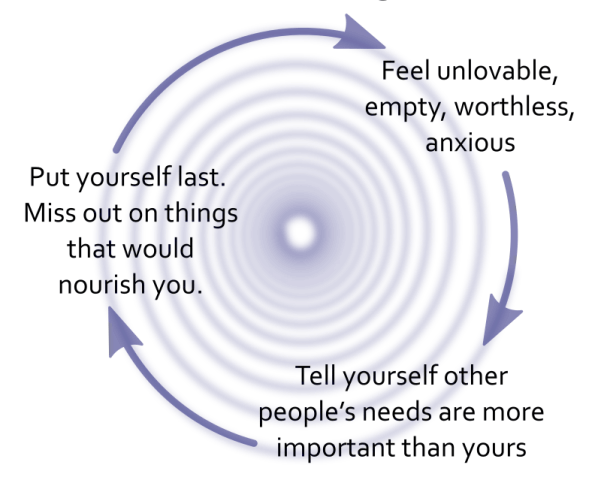You want to find out why your relationships go wrong despite your best intentions. (Spoiler: It’s probably because of your best intentions.)
But first a quick safety warning about labels.
I’m not a bit fan of the term ‘codependency’ because it sticks a fixed label on a process: The habit of seeking too much validation and self worth from other people. Understanding should be useful and offer a guide to change.
If you have a habit of thinking negatively about yourself, acquiring yet another label of what is “wrong with you” can make it worse.
Instead, I’ll show you a cognitive behavioural therapy (CBT) approach that helps you see codependency as a pattern, one you can change. Codependency is something you do, not something you are. It is not a disease, nor a life sentence.
Asking “Am I codependent?” and looking for a “yes” or “no” answer is part of the black-and-white, disempowering disease model that can keeps you stuck. Healing codependency partly means loosening up rigid, black-and-white thinking. So let’s start right now.
Instead of asking yourself “Am I codependent?” see it as a sliding scale. Everyone goes out of their way to help people they care about some of the time. And we all get it wrong occasionally. If you get it wrong in the same way repeatedly, there might be ways you can improve and I am here to help you do that.
If many of the signs below ring true for you, you are probably vulnerable to codependent patterns. If that is the case, don’t despair. Understanding is the first step to straightening things out.
Signs
If you are suffering from codependent style habits, you might often feel
-
Empty and unworthy
-
That without looking after others, your life would be pointless
-
Ashamed of mistakes or ways you have fallen short of your own standards
-
Anxious about potential conflicts you have been avoiding
-
Resentful and angry about people taking advantage of you
You might often think that
-
You are unworthy, unlovable, bad, or flawed
-
Your only value lies in what you do for others
-
Prioritising your own needs is selfish, which is bad.
-
Good people put others first.
-
Good people don’t argue.
In your behaviour, you might find
-
You are strongly drawn to help others.
-
You avoid standing up for yourself and tend to not say if someone upsets or annoys you. You internalise it instead.
-
You feel resentful that other people don’t treat you as well as you treat them.
-
You stay in relationships and friendships that are damaging for you.
-
You find it hard to make decisions.
-
You engage in numbing activities to soothe how upset you feel. These can be
-
Obvious “bad habits” like drinking alcohol and addictions
-
Less obvious ones like excessive TV watching, gambling, or internet surfing
-
Seemingly “good” habits like relying on meditation, yoga, exercise and calming techniques to “manage away” how upset you feel.
-
“The road to hell is paved with good intentions”
Your bad habit is when you take too much responsibility for other people’s lives and too little responsibility for your own.
It is a vicious cycle in which
Feeling bad about yourself
makes you put others first
which means you miss out on things you need to be happy
and allows other people to treat you badly
which makes you feel even worse.
The worse you feel, the more you try to soothe the pain by helping others, which makes you lose touch with your own desires even more.
As the cycle progresses it can lead to a self alienation or loss of self in which your only sense of yourself comes from what you do for others.
You see it most clearly in romantic and family relationships but the same pattern can happen among friends or in the workplace.
Causes
“Everything should be made as simple as possible, but not simpler” Albert Einstein
Explanations are also guides to change so it helps if they are simple and clear.
Codependent patterns are rooted in feeling unworthy and unlovable for who you are. The seeds are usually sown when you are a child, but it can be set off by difficult experiences in adulthood too.
Your experiences don’t have to have been dramatic and don’t have to have involved abuse or alcoholism.
There isn’t “a” cause of codependency. It is not a linear process. It’s a feedback loop.
A Negative Feedback Loop
It is helpful to understand codependency as a feedback loop. Audio feedback, for example, is the ear splitting howl you hear when a singer or guitarist puts his or her microphone too close to the amplifier. A small noise enters the microphone, which sends it to the amplifier, which makes it louder through the speaker and back into the microphone. The smallest sound can escalate into a painful screech.
In the same way, codependency is a cycle of feeling, thinking and behaving where each part amplifies the previous one. Just like a small sound can grow into the howl of audio feedback, when you have certain codependent traits, even small experiences can build into more and more damaging patterns without any one dramatic event that “caused” it.
The Codependency, People Pleasing Spiral

Beating Codependency
Beating codependency and coming home to you means learning to
-
Accept yourself and look after your needs
-
Loosen beliefs that are keeping you stuck
You’ll find more help for all of these around this site.
